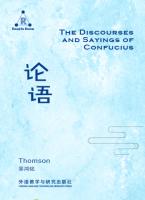书评
The Analects, an important classic of ancient Chinese Confucianism, was written at the beginning of the Warring States period and focuses on the thought of Confucius.
The Analects is a book full of philosophical interpretations of the truths of life, and the core concept of Confucius' thought system is "ren". The simplest expression of "ren" is "love for others", that is, respect and compassion for people. "Ren" appears 104 times in the Analects of Confucius, from which we can read "Ren" as sincerity.
In Confucius' time, society began to collapse, i.e. social norms collapsed, and the general public could not tell what was good and what was evil. Confucius searched for a way out in the chaotic world, and decided to develop a new and vibrant path for the ancient rites and music, so he searched for the Way. Confucius once said, "If you hear the Tao, you can die in the evening." The Tao is the true meaning of Confucianism.
I think Confucius never thought that "human nature is good", but he said, "I have never seen anyone who is as good at virtue as he is at sex. This is enough to show. So Confucius believed that "human nature is inherently evil"? No, Confucius thought that everyone has a conscience. Many people think that conscience is cultivated later in life, but in fact it is inherent. When a person does something bad, people often say, "This person has lost his conscience." It does not matter whether the conscience is lost or gained, it depends on whether it is manifested. Before the Wenchuan earthquake, some of our predecessors commented that the post-80s and post-90s are selfish, individualistic and self-centered, with little thought for others. Wenchuan earthquake occurred, these young people who were criticized, their conscience is reflected in the best way, contribute money and efforts, many major earthquake relief work is done by them. Conscience comes from within, funding the most sincere depths of the heart, never something superficial. The power of Confucianism comes to trigger the continued embodiment of our conscience.
The conscience of Confucianism is the demand for goodness. You may ask, "Goodness" is not a characteristic of Confucianism, but many religions have good deeds. Buddhism has a cycle of birth and death, a previous life and a next life, a cause and an effect. People are influenced by its ideas, so they do good deeds and accumulate virtue, so that people who believe in Buddhism will naturally go about doing good deeds, which are self-centered, and such goodness starts from a self-centered point of view, unlike Confucianism. If people who don't believe in religion don't have to do good deeds? Killing and setting fire to people is a trivial matter? That would cause chaos in the world! The goodness of Confucianism requires maintaining a conscience, perfecting one's cultivation, pursuing personal excellence, transcending oneself, and not needing to have profit, because doing cultivation makes one's own business! I think, as long as everyone, from the inside to sincerely do everything, sincerely treat people, improve their own cultivation, such a life will be very pleasant, and this is the meaning of life.
I think that it is not a person who has human characteristics. Because there is no cultivation can not become a person. Without cultivation, a human being is no different from an ordinary animal. Man is to look to the light and pursue civilization!
In the Analects of Confucius, Tzu said, "Coquettish words are not enough for people." Even if the mouth full of pleasing flowery words, full of pleasing hypocritical look, this kind of people gaining power is not much, then what he inspires us, is it that we have to be board in life; serious to do everything, this kind of people are not welcome, then the Analects are outdated? No! Now we have to be sincere while being "clever"!
Once Yan Yuan, Ji Lu and Confucius were talking about their aspirations, and Ji Lu asked his teacher, "What is your aspiration?" This was a very good question. If he hadn't asked it, perhaps, we wouldn't know what Confucius' ambition was now. So, how did he answer? "For the old to be secure, for friends to be trustworthy, and for the young to be wistful." Great answer. True philosophy is oriented to all mankind, and this is perhaps the highest cultivation of human character. No one in the world has done it, but Confucius' proposal gives us a direction to strive for and transcend ourselves, which is the commonwealth of mankind.
The Analects of Confucius has taught me so much, about making friends, about nurturing the body ......
The humanistic spirit in Analects is our eternal pursuit. I hope you will pay more attention to national studies. More insights into some writings, so that we can improve our own cultivation together.



 京公网安备 11010802032529号
京公网安备 11010802032529号